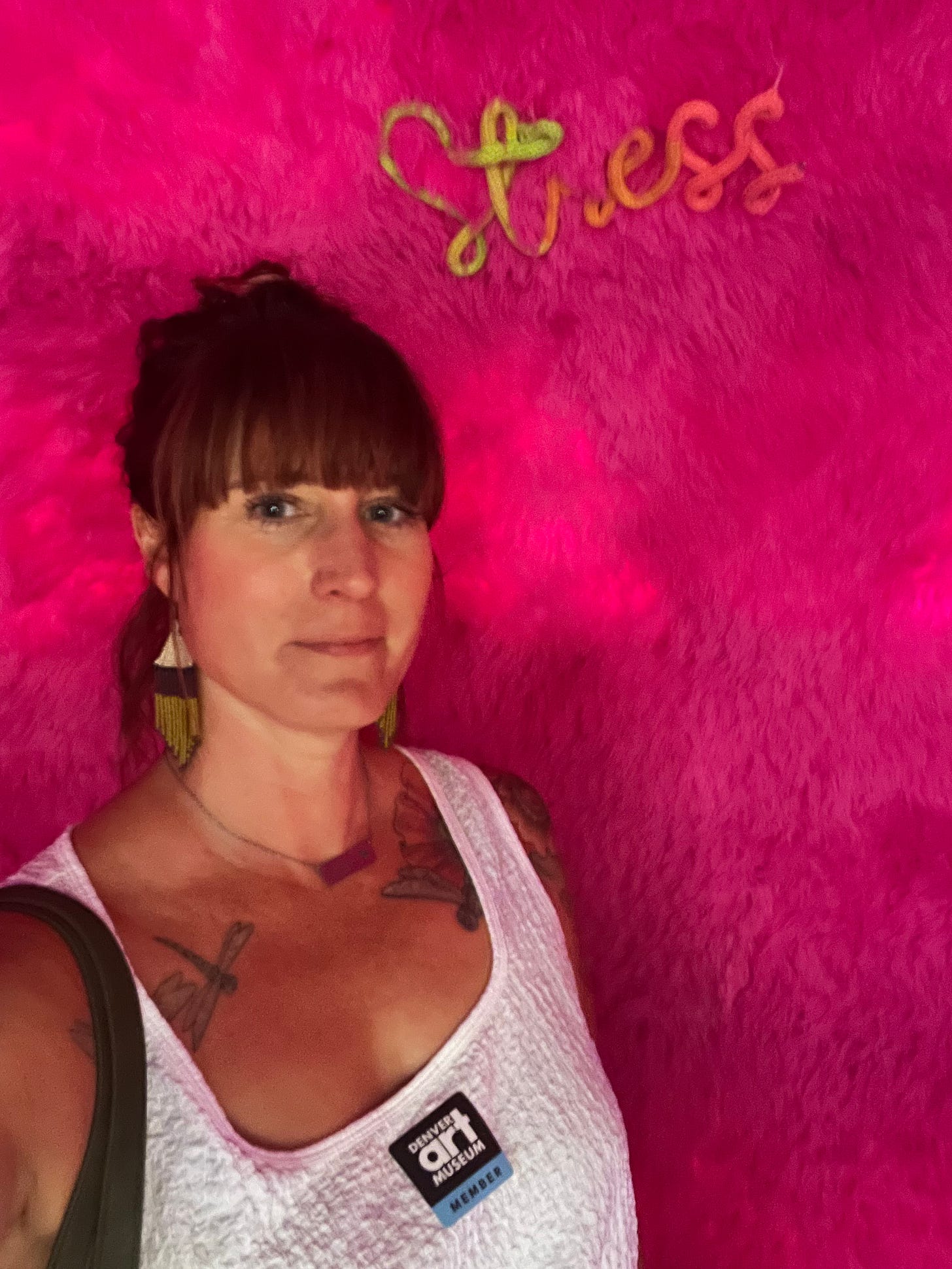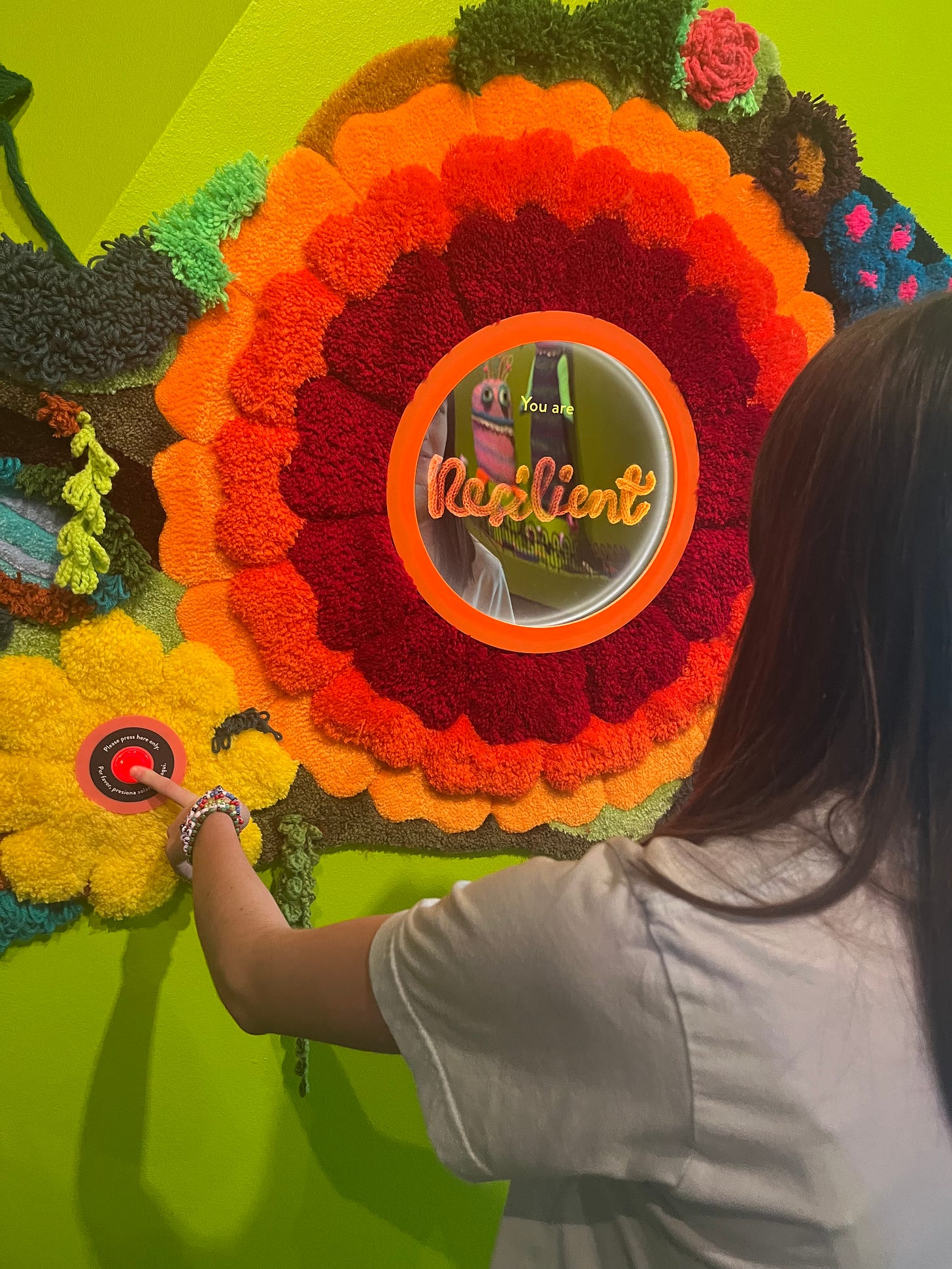The Artist's Way Hits Different When You're a Midlife Woman
How to prioritize your own creative spark when you're a perimenopausal caregiver.
No, that’s not a joke, but it sounds like it, doesn’t it? How can a person even write “creative spark” and “perimenopausal caregiver” in the same sentence and keep a straight face? I believe my comment about Gen X women from a few weeks ago still stands: “We are phoenixes rising from the flashes.”
But seriously. Every time I get together with my best friends, the midlife vibes are strong. We sit around eating our stupid high-protein snacks drinking our stupid low-sugar cocktails and swap notes about whose OB-GYN appointment is coming up, who is on black cohosh or progesterone, who switched to multifocal contacts and ditched the reading glasses (it’s me, you guys, oh my god, it’s me!), whose kids have a new therapist, and who was recently reminded to always carry an emergency Perimenopause Purse Kit with spare underwear and a super tampon (ahem, also me, you guys. PSA: Don’t let yourself be the woman wandering commando around the art museum after a Code Red situation).

Whether we are talking about our relationships or jobs or families, everything is viewed through the crimson-colored glasses (see what I did there?) of midlife. And I’m good with that. Because aside from the magnesium and multifocal lenses, I think it’s pretty fucking awesome to have arrived at the Queen Era. And slowly but surely, we are shaking off apologies (we still holler them at the male partners who just listened to the Code Red museum story; sorry, guys, but actually, not really).
I can’t tell you how many midlife women I work with who approach their writing with somewhere between a droplet and a tidal wave of apology. I’m not saying this from a point of superiority, either. I once wrote a cheeky piece for The Belladonna Comedy called, “I Apologize for My Memoir,” which was a whole lot of people-pleasing thinly veiled as satire. Especially when you are an essayist, personal blogger, or memoirist, everything you write feels stamped with a disclaimer reading, “I totally understand that writing about my own life is navel-gazing and self-indulgent. Sorry about me.” Never mind the fact that we devour other writers’ memoirs and essays with interest and enthusiasm.
So many of us have been conditioned to minimize our accomplishments and relegate our creativity and dreams to the bottom of the to-do list, underneath “find the missing volleyball jersey; schedule colonoscopy; pick up everyone’s meds; wake up at five am to exercise before a ten-hour work day.”
The Artist’s Way meets the midlife woman
Last winter I officially did The Artist’s Way 12-week “program,” following Julia Cameron’s iconic book. Originally published in 1992, it’s described as follows: “The Artist's Way by Julia Cameron is a groundbreaking guide to unlocking our innate creative potential. Emphasizing the connection between creativity and spirituality, Cameron presents a 12-week course of exercises, tools, affirmations, and insights designed to inspire creative recovery and artistic self-discovery.” The definition of “artist” is loose, by the way. You could be a visual artist, a writer, a musician, a photographer, or a passionate crafter. . . but also? Cameron maintains that creativity is part of everyone’s essence, whether you are a career artist, a hobbyist, or someone who enjoys daydreaming, hiking, and wandering around museums (underwear optional).
Before I read the entire book and really committed to the practice, I had been exposed to snippets of theory from it—I was familiar with “morning pages” (which I was very judgy about, not gonna lie), and had done some of the writing prompts in an abbreviated workshop. But I decided it was time to really dive into it last January—and I wasn’t sorry.
I found that once I started doing the practice of morning pages, I relied on it almost as much as my morning latte (I said almost, calm down). I originally thought morning pages were a pretentious way to do creative writing first thing in the morning, and I was totally wrong. They truly are freeform journaling, a brain dump, a channeling of angst and stress and fears and hopes and ideas and dreams onto the page before you even get out of bed. I loved it. Doing three pages when I was barely awake was like a stress-release valve. The practice of morning pages was incredibly regulating for my ADHD brain.
Another aspect of the book that I loved was observing synchronicities flowing back into my life—the more I tapped into my own creativity and intuition, the more things started “clicking,” the more frequently impossible strokes of good luck or inspiration or—well, synchronicities really is the only way to put it—began to pop up.
I started to take myself more seriously. I started to wonder if maybe it wasn’t self-indulgent or unrealistic for me to believe that I could have a career doing things I love—writing, producing, performing, facilitating workshops—and that it really is our birthright to be joyful and creative and connected.
As soon as I had that thought, saboteurs started to pop up: people’s homes are burning and flooding and children are starving and plenty of people hate their jobs—why do you think you’re so special that you’re entitled to creativity? Cameron is ready for this response, and she guides you through it beautifully. It was almost like she anticipated every objection and obstacle to each reader actually claiming their own creativity, passion, and happiness.
But there’s another layer, too. It’s one thing if you are a single, childless artist in your twenties or even seventies. Let’s be honest—it’s also another thing if you’re a man. Carving out time for a weekly “artist’s date” when you are driving kids around, managing doctors appointments (which become more abundant and varied when you hit midlife), working, and managing a household is nearly laughable. Factor in a partner, parents (or aging pets!) who may require care, parenting teenagers or college students—not to mention all the women in their forties who just began having kids—and creativity feels like something *precious* to scoff at.
The first time I read The Artist’s Way and spent a week on each chapter, I did it in community with other women online. And I loved it. Some weeks the only thing that kept me accountable to reading the chapter and doing the exercises was the fact that I knew I would have to talk about it in our weekly Zoom meeting. And every single week, I felt lighter and somehow also fuller, more connected, every time we ended our check-in meeting. Doing The Artist’s Way in community is the way to go, in my opinion—it just deepens it. So I’ve decided to do the whole thing again, but this time, using the lens of midlife women to make the program hit a little deeper. And I’m inviting you to join me.
I am so excited to share my latest creation with you guys. It’s going to be juicy. It’s going to help each of us get more in touch with what we actually want—when was the last time you asked yourself what you were craving, what lit you up, what weighed you down?
As we read the chapters and complete the tasks, write our morning pages and do our best to carve out a weekly “date” with ourselves, we’ll also dissect some of the factors and systems in place that stand in our way as women at this stage of life. Like, for example, invisible labor, martyr archetypes, hormonal changes, and the patriarchy, to name a few.
For 12 weeks, we’ll spend just a little time each day connecting to ourselves, reflecting, prioritizing creativity, and actively seeking joy. And we’ll do it together, which is just always so much more fun. I really hope you’ll join me, whether or not you identify as an artist of any kind. We all have creativity inside us, and as Julia Cameron says,
“It’s never too late, too egotistical, or too selfish to do something for yourself.”
We start September 2nd, so save a spot for yourself now! And if you have any questions, leave me a comment or DM me!
Also, I’d love to hear from you in the comments:
What are the biggest obstacles in your life right now that prevent you from carving out time for creativity or joy?
XO,
Steph






The Artist’s Way and morning pages have been my writing touchstone for 30 years. The foundational, grounding practice of meeting myself on the page, in all the rawness and realness of a life. Especially during these midlife years, it’s been essential. Glad you have found it to be generative for you too, Steph!
I’m interested. Haven’t done The Artist’s Way since around when it came out, but I’ve been writing and judging everything I write immediately. What you said about consuming memoir is *so true* - it’s almost the entirety of what I read. But write such drivel? Surely I’d not produce the quality of those I read (Didion, you savage). Why are we like this.
Finishing a workshop now, and neurodivergent and and and. Need to think on this a moment. I should do this for myself.